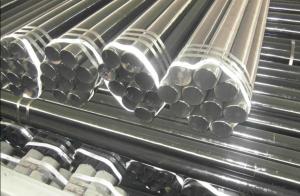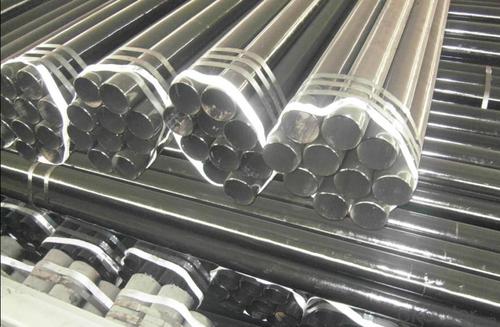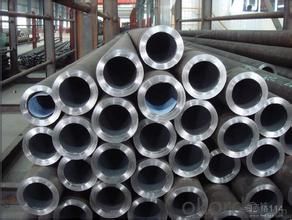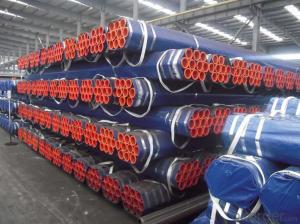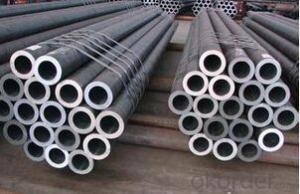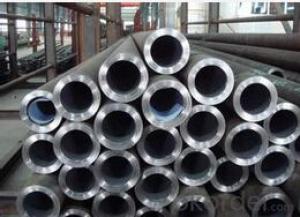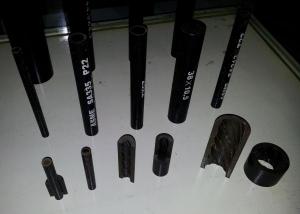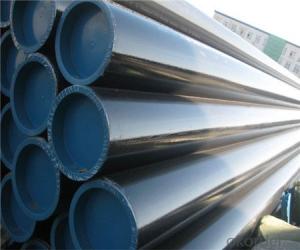2017 seamless steel tubes and pipes fort coupling stock of casing and boiler
- Loading Port:
- Tianjin
- Payment Terms:
- TT or LC
- Min Order Qty:
- 25 m.t.
- Supply Capability:
- 6000 m.t./month
OKorder Service Pledge
OKorder Financial Service
You Might Also Like
Product Description:
1、Structure of Welded Black ERW Steel Pipe:
ERW steel pipe is electric resistance welding, the abbreviation for ERW for transporting oil and natural gas vapor liquid objects, can meet the requirements of high and low pressure, the transport in the world with pipe sector accounted for a pivotal position.
2、Main Features of Welded Black ERW Steel Pipe:
• High manufacturing accuracy
• High strength
• Good visual effect
• Reasonable price
• Small inertia resistance
• Strong heat dissipation ability
3、 Welded Black ERW Steel Pipe Images:
Packaging & Delivery
Packaging Details: | seaworthy package,bundles wrapped with strong steel strip |
Delivery Detail: | 15-30days after received 30%TT |
4、Welded Black ERW Steel Pipe Specification:
·
·
Standard | GB, DIN, ASTM |
Grade | B、Q235 |
Thickness | 1 - 33 mm |
Section Shape | Round |
Outer Diameter | 21 - 610 mm |
Place of Origin | Tianjin, China (Mainland) |
Secondary Or Not | Non-secondary |
Application | Hydraulic Pipe |
Technique | Cold Drawn |
Certification | API |
Surface Treatment | factory state or painted black |
Special Pipe | API Pipe |
Alloy Or Not | Non-alloy |
Length | 5-12M |
Outer Diameter | 21.3-610mm |
Grade | 20#, 45#, Q345, API J55, API K55, API L80, API N80, API P110, A53B |
Standard | ASME, ASTM |
1.Material:20#(ASTM A 106/A53 GRB.API5LGRB,GB),45#,16Mn,10#.
2.Specification range:OD:21.3-610mm,WT:6-70mm,length:6-12m or according to the requirement of clients.
3.Excutive standards:GB,ASME API5L.ASTM A 106/A53,Despite of the above standards,we can also supply seamless steel pipe with standard of DIN,JIS,and so on,and also develop new products according to the requirements of our clients!
4.Surface:black lacquered,varnish coating or galvanized.
5.Ends:Beveled or square cut,plastic capped,painted.
6.Packing:bundles wrapped with strong steel strip,seaworthy packing.
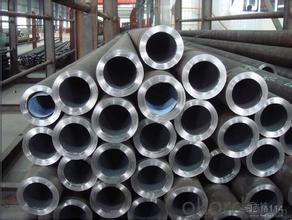
- Q: What are the different types of steel pipe fittings for industrial applications?
- There are several types of steel pipe fittings commonly used in industrial applications, including elbows, tees, reducers, couplings, flanges, and unions. These fittings are designed to connect and redirect the flow of fluids or gases within a piping system, ensuring proper functionality and efficiency in various industrial processes.
- Q: Can steel pipes be used for brewery installations?
- Yes, steel pipes can be used for brewery installations. Steel pipes are often used in breweries for various applications such as transferring fluids, connecting equipment, and creating plumbing systems. Steel pipes are known for their durability, strength, and resistance to corrosion, which makes them suitable for handling the harsh conditions and high-pressure environments typically found in brewery installations. Additionally, steel pipes can be welded together, allowing for seamless connections, ensuring a reliable and leak-free operation. However, it is important to ensure that the steel pipes used in brewery installations meet the necessary standards and regulations to ensure the safety and quality of the beer production process.
- Q: How are steel pipes used in the manufacturing of conveyor systems?
- Steel pipes are commonly used in the manufacturing of conveyor systems to provide a durable and reliable structure for transporting various materials. They are typically used as the main framework for the conveyor system, supporting the conveyor belt and other components. Steel pipes are known for their strength and resistance to wear and tear, making them ideal for handling heavy loads and withstanding continuous use. Additionally, steel pipes can be easily shaped and welded, allowing for customization and flexibility in conveyor system design.
- Q: What is the difference between hot-rolled and cold-rolled steel pipes?
- Hot-rolled steel pipes are manufactured by heating the steel billets or coils to a high temperature, which allows for easier shaping and forming. The hot-rolled process also results in a rougher surface finish and larger tolerances. In contrast, cold-rolled steel pipes are made by rolling the steel at a lower temperature, resulting in a smoother surface finish, tighter tolerances, and improved strength and durability.
- Q: Can steel pipes be used for the construction of transmission towers?
- Yes, steel pipes can be used for the construction of transmission towers. Steel pipes are commonly used in the construction industry due to their strength, durability, and ability to withstand heavy loads. They provide structural support and stability required for transmission towers, making them a suitable choice for this application.
- Q: What steel pipes are buried for outdoor heating pipes? Seamless or welded tube? Are there any rules for specific countries? Can use the seamed tube?
- The pipe material of heating pipe network should be designed according to the requirement. When the design is not specified, the following requirements shall be met:1 when the pipe diameter is less than or equal to 40mm, welded steel pipe shall be used.2 when the pipe diameter is 50 ~ 200mm, welded steel pipe or seamless steel pipe shall be used.3 when the pipe diameter is greater than 200mm, spiral welded steel pipe shall be used.
- Q: How are steel pipes tested for quality and strength?
- Steel pipes are tested for quality and strength through various methods, including destructive and non-destructive testing. Destructive tests involve subjecting samples to extreme conditions such as tension, compression, or bending to assess their mechanical properties. Non-destructive tests, on the other hand, utilize techniques like ultrasonic inspection, magnetic particle testing, and radiographic examination to detect any defects or anomalies without damaging the pipes. These rigorous testing procedures ensure that steel pipes meet the required standards and can withstand the intended applications.
- Q: What are the different types of steel pipe coatings for chemical processing plants?
- There are several types of steel pipe coatings commonly used in chemical processing plants, including epoxy coatings, polyethylene coatings, and fusion-bonded epoxy coatings. These coatings provide protection against corrosion and chemical damage, ensuring the longevity and safety of the pipes in such environments.
- Q: How are steel pipes used in the transportation of liquids and gases?
- Due to their durability, strength, and resistance to corrosion, steel pipes find wide applications in the transportation of liquids and gases. Various industries such as oil and gas, water supply, and chemical processing commonly employ them. For the transportation of liquids, steel pipes serve as conduits for crude oil, refined petroleum products, water, and other fluids. These pipes are designed to withstand high pressure and maintain the integrity of the liquid being transported. The smooth inner surface of steel pipes minimizes friction, enabling efficient flow and reduced energy consumption. Moreover, the strength of steel pipes ensures that they can support the weight of the liquid without deformation or failure. In gas transportation, steel pipes are indispensable for the safe conveyance of natural gas, propane, and other compressed gases over long distances. These pipes are engineered to endure high pressures and extreme temperatures. They are also designed to prevent leakage, which is of utmost importance when dealing with flammable or toxic gases. The strength and durability of steel pipes make them ideal for withstanding the stress and strain that may occur during gas transportation. Additionally, steel pipes are frequently utilized in the construction of pipelines for long-distance transportation of liquids and gases. These pipelines can span hundreds or even thousands of kilometers, and steel pipes are the preferred choice due to their high strength and long-term reliability. They can bear the weight of the pipe and the substance being transported, as well as external forces such as soil pressure and temperature fluctuations. In summary, steel pipes play a vital role in the transportation of liquids and gases. Their durability, strength, and resistance to corrosion make them the preferred choice for conveying various substances over long distances. Whether it is for oil and gas, water supply, or chemical processing, steel pipes ensure the safe and efficient transportation of fluids and gases, contributing to the functioning of various industries and economies worldwide.
- Q: What are the different types of steel pipe nipples?
- There are several different types of steel pipe nipples that are commonly used in various applications. These types include seamless, welded, threaded, and grooved steel pipe nipples. 1. Seamless steel pipe nipples: Seamless nipples are manufactured from a solid piece of steel without any seams or joints. This type of nipple is often preferred for high-pressure or critical applications due to its superior strength and reliability. Seamless nipples can be threaded or plain-ended, depending on the specific requirements. 2. Welded steel pipe nipples: Welded nipples are made by joining two or more pieces of steel together through welding. This type of nipple is commonly used in non-critical applications where high pressure is not a concern. Welded nipples are available in both threaded and plain-ended options. 3. Threaded steel pipe nipples: Threaded nipples have external threads at one or both ends, allowing them to be easily connected to other threaded fittings or pipes. These nipples are commonly used in plumbing, water supply systems, and other applications where a secure and leak-free connection is essential. Threaded nipples are available in various lengths and diameters to accommodate different requirements. 4. Grooved steel pipe nipples: Grooved nipples have a groove or indentation around the circumference of the nipple, which allows for easy installation using grooved couplings. This type of nipple is commonly used in fire protection systems, HVAC systems, and other applications where quick and efficient installation is necessary. Grooved nipples are available in various sizes and configurations to suit different piping systems. In summary, the different types of steel pipe nipples include seamless, welded, threaded, and grooved nipples. Each type has its own advantages and is suitable for specific applications. It is important to consider the specific requirements and conditions of the project before selecting the appropriate type of steel pipe nipple.
Send your message to us
2017 seamless steel tubes and pipes fort coupling stock of casing and boiler
- Loading Port:
- Tianjin
- Payment Terms:
- TT or LC
- Min Order Qty:
- 25 m.t.
- Supply Capability:
- 6000 m.t./month
OKorder Service Pledge
OKorder Financial Service
Similar products
Hot products
Hot Searches
Related keywords
